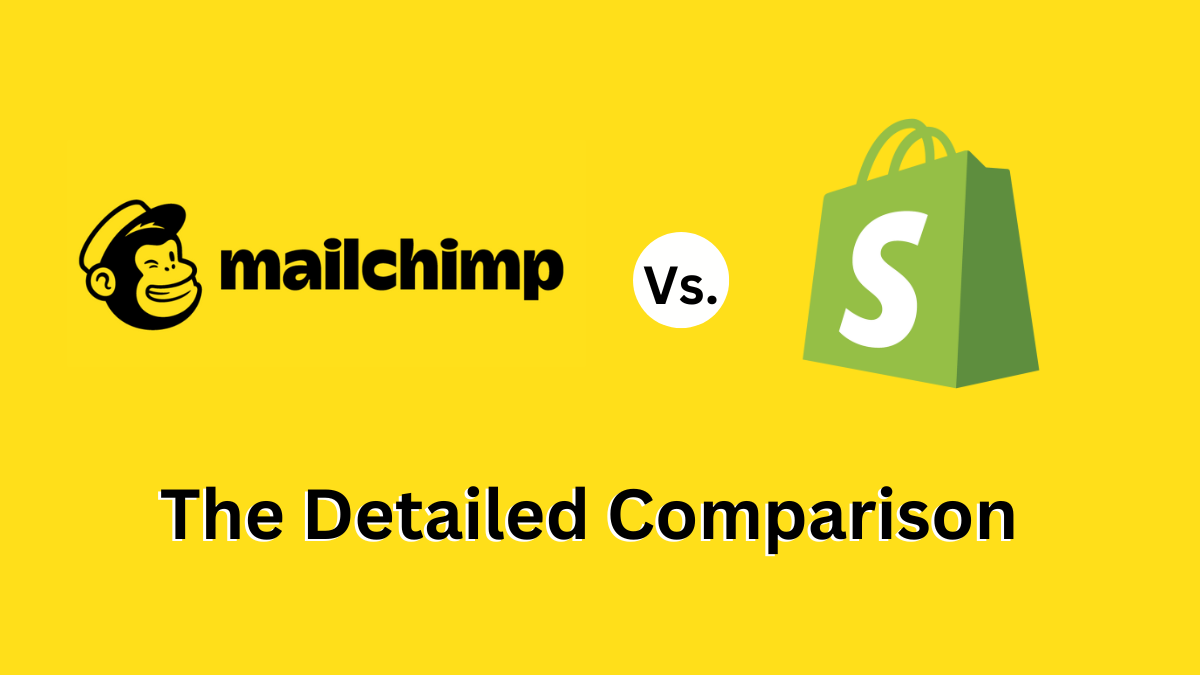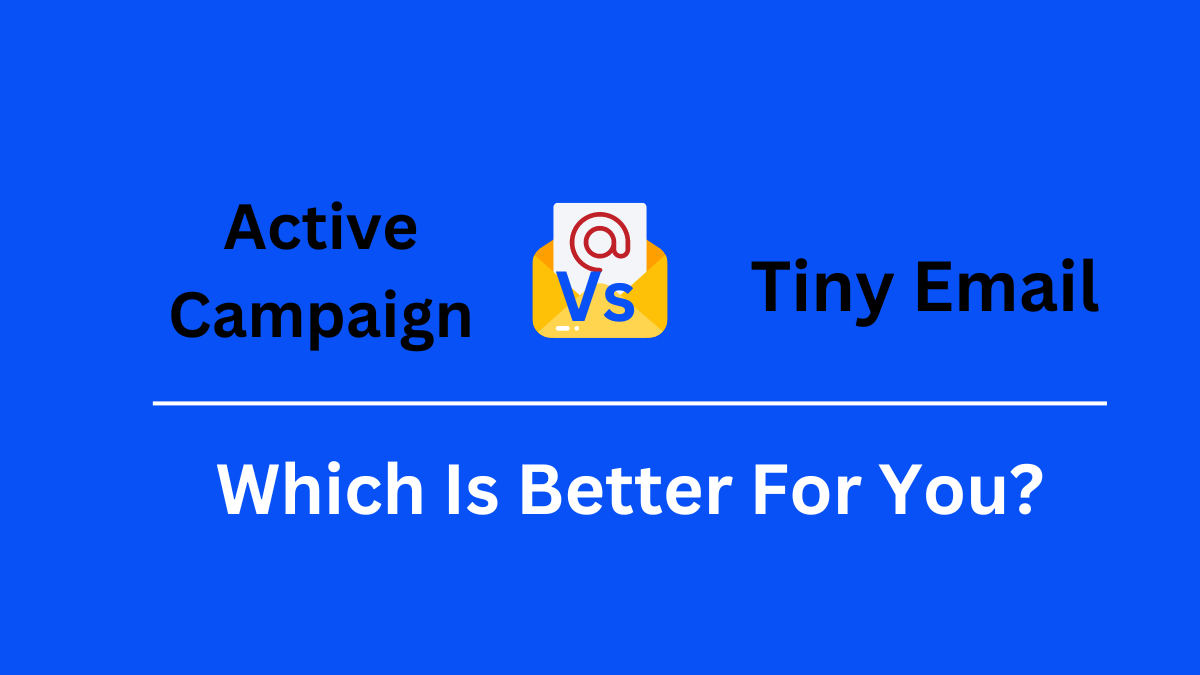Are you a Shopify e-commerce shop or a dropshipping business owner? Then, with a few email marketing platforms perfect for you. Shopify Email and Mailchimp are the most popular email marketing tools for Shopify dropshipping. It can be difficult to choose the right one for your business. Two popular options that often come up in discussions are Shopify Email Marketing vs MailChimp. In this blog post, we’ll dive into the details of these two platforms, comparing their features, and pricing, and ultimately helping you determine which one is better suited for your Shopify Store.
What Is Shopify Email Marketing?
Shopify Email is an integrated email marketing platform designed specifically for Shopify users. It allows merchants to create and send professional-looking emails directly from their Shopify admin panel. With seamless integration into the Shopify ecosystem, it offers convenience and ease of use for businesses already utilizing the platform.
What Is MailChimp?
MailChimp is one of the most well-known email marketing platforms available today. It has established itself as a leader in the industry by offering a wide range of features suitable for businesses of all sizes. Whether you’re a small startup or a large enterprise, MailChimp provides robust tools to create effective email campaigns.
Features: Shopify Email vs MailChimp:
Now that we have a brief understanding of both platforms let’s compare their features side by side. It’s important to consider these factors when deciding which platform aligns best with your business goals.
User Interface and Ease of Use
A user-friendly interface is vital for streamlining your email marketing efforts. Let’s explore how Shopify Email and MailChimp differ in terms of user experience:
Shopify Email User Interface
Shopify Email offers a seamless integration within the Shopify platform. This means that if you’re already familiar with Shopify’s interface, using Shopify Email will be second nature. The drag-and-drop editor makes designing visually appealing emails quick and straightforward. Additionally, since all customer data is stored within Shopify, personalizing emails based on purchase history or customer behavior becomes much simpler.
MailChimp User Interface
MailChimp has long been known for its intuitive interface. The platform provides an extensive library of templates to choose from, making it easy to create professional-looking emails without any coding knowledge. MailChimp also offers robust automation capabilities, allowing you to set up targeted campaigns based on specific triggers or customer actions.
Both platforms excel in terms of user experience; however, if you are already utilizing the Shopify ecosystem for your online store, integrating with Shopify Email can streamline your workflow seamlessly.
Deliverability and Customer Support
The success of your email campaigns relies heavily on high deliverability rates and prompt customer support:
Shopify Email Deliverability and Support
As Shopify Email is built directly into the Shopify platform, deliverability is generally reliable. By leveraging the infrastructure already in place, emails sent through Shopify Email have a higher chance of landing in subscribers’ inboxes rather than getting lost in spam folders. Additionally, Shopify offers 24/7 customer support via chat, email, or phone for any technical assistance you may require.
MailChimp Deliverability and Support
MailChimp also boasts excellent deliverability rates. With a dedicated team consistently monitoring their infrastructure and maintaining good relationships with major ISPs, MailChimp ensures that your emails reach their intended destinations. MailChimp provides customer support through various channels such as live chat, email support tickets, and an extensive knowledge base.
Both platforms prioritize deliverability; however, if you are already using Shopify as your e-commerce platform, utilizing Shopify Email can simplify your overall support experience.
Integration with Third-party Apps & Platforms
Integration with other tools and platforms is crucial for streamlining your marketing efforts. Let’s compare the integration capabilities of Shopify Email and MailChimp:
Shopify Email Integrations
Shopify Email integrates seamlessly with other apps and services within the Shopify ecosystem. This includes popular tools such as Klaviyo for advanced email automation, Omnisend for multi-channel marketing, and ReConvert for post-purchase upsells. By leveraging these integrations, you can create a comprehensive marketing stack tailored to your business needs.
MailChimp Integrations
MailChimp offers a wide range of integrations with various e-commerce platforms, CRMs, and other marketing tools. Whether you’re using WooCommerce, Magento, or Salesforce, MailChimp likely has an integration available. This allows you to connect your email marketing efforts with other essential aspects of your business seamlessly. There are 300+ integrations available in MailChimp.
Both platforms provide extensive integration options; however, if you are already using Shopify or have plans to do so in the future, choosing Shopify Email can simplify the integration process.
A/B Testing: Finding the Perfect Formula
A/B testing is a powerful technique that allows you to compare different versions of your email campaigns to determine which performs better. Both Shopify Email and MailChimp offer A/B testing features but with some differences.
Shopify Email’s A/B Testing
Shopify Email provides a simple yet effective A/B testing feature that enables you to test different subject lines or content variations within your emails. You can easily create multiple test groups and measure open rates or click-through rates to identify the winning version. Although it doesn’t offer as many advanced options as MailChimp, Shopify Email’s straightforward approach makes it accessible for beginners.
MailChimp’s A/B Testing
MailChimp takes A/B testing to another level with a variety of options and customization possibilities. Alongside subject line and content variations, you can also test send times, from names, or even entire templates. Furthermore, MailChimp offers statistical significance calculations so you can be confident in your results. If you’re looking for more extensive A/B testing capabilities with advanced metrics, MailChimp may be the preferred choice.
Email Automation: Streamlining Your Marketing Efforts
Automating your email campaigns saves time and ensures consistent communication with your customers. Let’s explore how both platforms handle email automation.
Shopify Email’s Email Automation
Shopify Email offers basic automation features designed to simplify your email marketing efforts. You can set up automated welcome emails, abandoned cart reminders, and order notifications. While Shopify Email’s automation capabilities are limited compared to MailChimp, they provide essential functionality for businesses starting with email marketing or those seeking a streamlined approach.
MailChimp’s Automation Workflows
MailChimp excels in email automation with its robust and flexible workflows. With their intuitive drag-and-drop builder, you can create intricate automation sequences based on triggers, conditions, and actions. From welcome series to post-purchase follow-ups, the possibilities are endless. MailChimp’s extensive range of automation options makes it an ideal choice for businesses that rely heavily on email marketing and want to implement complex customer journeys.
Analytics and Reports: Gaining Insights for Growth
Analyzing your email performance is crucial to optimize your campaigns. Let’s see how Shopify Email and MailChimp handle analytics and reporting.
Shopify Email’s Analytics
Shopify Email provides basic analytics that gives you an overview of your campaign performance. You can track metrics like open rates, click-through rates, and unsubscribe rates. Additionally, you can view revenue generated from each campaign directly within your Shopify dashboard. While Shopify Email’s analytics may be sufficient for small businesses or beginners, those seeking more detailed insights may find it lacking.
MailChimp’s Reports
MailChimp offers comprehensive reports that provide in-depth insights into your email campaigns’ performance. You can monitor engagement metrics such as opens, clicks, social media activity, e-commerce data, and much more. Their reports also include industry benchmarks so you can compare your performance against similar businesses. If detailed analytics and data-driven decision-making are important to you, MailChimp’s reporting capabilities will prove invaluable.
Pricing: Shopify Email vs MailChimp
Pricing is often a crucial factor when considering any business tool or service. Let’s take a closer look at how Shopify Email and MailChimp compare in terms of cost:
Shopify Email Pricing
Shopify Email is built directly into the Shopify platform, providing convenience and simplicity for users who are already utilizing Shopify for their online store. With Shopify Email, pricing is straightforward and based on the number of subscribers in your email list:
- 10,000 free email per month
- The next 1,000 emails are priced at $1 per month.
- For 300k+ subscribers then prices are $0.65 per 1,000 emails per month.
- For 700k+ subscribers then prices are $0.55 per 1,000 emails per month
MailChimp Pricing
MailChimp offers several pricing plans designed to cater to businesses of all sizes. Their plans are based on the number of subscribers as well as additional features you may require:
- Free Plan: This plan allows you to have up to 500 subscribers and send up to 1,000 emails per month.
- Essentials Plan: Starting at $13 per month.
- Standard Plan: Starting at $20 per month.
- Premium Plan: $350 per month.
When comparing the pricing of Shopify Email and MailChimp, it’s important to consider your current subscriber count and projected growth. If you already use Shopify for your online store and have a moderate number of subscribers, Shopify Email may offer a cost-effective solution. However, if you require advanced features or have a larger email list, MailChimp’s pricing plans provide more flexibility.
Is Shopify Email as good as Mailchimp?
Shopify email is an email marketing tool specialized for Shopify email marketing developed by Shopify. On the other hand, Mailchimp is the leading email marketing tool for any type of business. Shopify email is good for small Shopify stores and if you are a beginner in email marketing.
Can I use Mailchimp with Shopify?
When comparing Shopify Email and MailChimp side by side, it becomes clear that both platforms have strengths depending on your specific needs.
- If you’re new to email marketing or prefer a simplified approach with seamless integration into your Shopify store, Shopify Email offers a user-friendly experience.
- On the other hand, if you require advanced features, extensive automation capabilities, and robust analytics, MailChimp emerges as the go-to choice.
Ultimately, the decision between Shopify Email and MailChimp comes down to your business requirements, budget, and level of expertise. Consider your goals and prioritize the features that align with your marketing strategy. Whichever platform you choose, both Shopify Email and MailChimp have proven track records in helping businesses succeed with email marketing.
Conclusion
In conclusion, when deciding between Shopify Email and MailChimp for your email marketing needs, it’s vital to consider your specific requirements. If you’re already using Shopify as your e-commerce platform and have a moderate subscriber count, Shopify Email offers a convenient solution that seamlessly integrates into your existing workflow. On the other hand, if you require advanced features or plan on expanding beyond email campaigns in the future, MailChimp provides a more versatile platform with extensive functionality.





